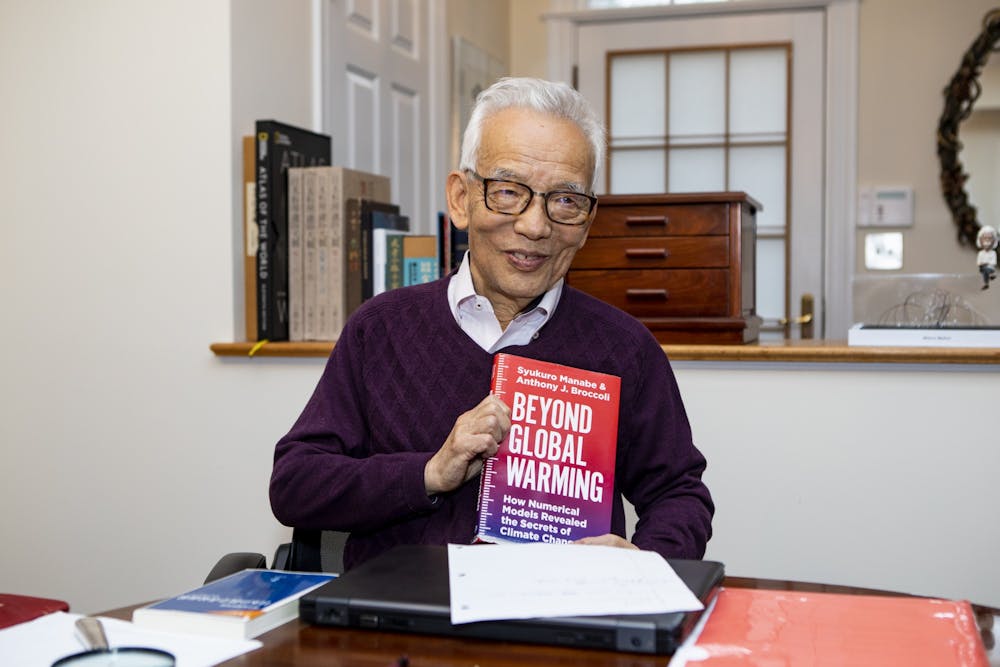On Tuesday, Oct. 5, Princeton senior meteorologist Syukuro “Suki” Manabe was awarded the Nobel Prize in Physics 2021 “for the physical modelling of Earth’s climate, quantifying variability and reliably predicting global warming.” His work is widely considered to be foundational to understanding climate change.
Manabe was jointly awarded the prize with Klaus Hasselmann, an oceanographer at the Max Planck Institute for Meteorology. Giorgio Parisi of the Sapienza University of Rome was also awarded the Prize in Physics for his separate “discovery of the interplay of disorder and fluctuations in physical systems from atomic to planetary scales.”
Manabe joins 21 University faculty and alumni who have been awarded the Nobel Prize in Physics. Recent recipients include Professor Emeritus James Peebles GS ’62 who received the 2019 prize for his discoveries in physical cosmology and Kip Thorne GS ’65 who received the 2017 prize for his contribution to the observation of gravitational waves.
Manabe’s pioneering work in the 1960s involved the use of computer simulations to study global climate change. After hundreds of hours of testing, his climate circulation model showed that increased carbon dioxide levels in the atmosphere result in higher temperatures at Earth’s surface. Through his research, he “laid the foundation for the development of current climate models,” the Royal Swedish Academy of Sciences said in a statement.
Manabe is also the co-author of “Beyond Global Warming.” In the book, he presents a firsthand account of how scientists have come to understand the fundamental processes behind climate change using numerical models.
Manabe was born in Ehime-Ken, Japan, in 1931 and received his B.S. and Ph.D. from Tokyo University in 1953 and 1958, respectively. Shortly after receiving his Ph.D., he moved from Japan to the United States to work at the U.S. Weather Bureau — now known as the National Weather Service — where he used physics for modeling weather systems.
In 1963, Manabe moved to Princeton and became one of the founding scientists of the Geophysical Fluid Dynamics Laboratory (GFDL), a joint endeavor by the University and the National Oceanic and Atmospheric Administration (NOAA). Manabe has been a member of Princeton’s faculty since 1968.
He is also a member of the National Academy of Sciences, an honorary member of the American Meteorological Society, and a fellow of the American Geographical Union.
In the afternoon after the announcement, the University held a press conference in Richardson Hall to celebrate Manabe and his achievements. Manabe was joined on stage by University Provost Deborah Prentice, University Spokesperson Ben Chang, Professor Stephan Fueglistaler, Director of the University’s Atmospheric and Oceanic Sciences program and of the Cooperative Institute for Modeling the Earth System, and Thomas Delworth, Senior Scientist at the GFDL.
Manabe thanked the Royal Swedish Academy of Science for their generosity in awarding him the Nobel Prize. He also thanked the GFDL, NOAA, and Princeton, where he mentioned he has “enjoyed exploring climate change.”
Describing Manabe, Delworth noted traits he felt were key to his character and work.
“That insatiable curiosity, sense of wonder, along with the ability to boil any topic into its essence, and incredible persistence and hard work — those are some of Suki’s characteristics that have guided him over the years,” Delworth said.

“Suki in his presence elevates the entire field of climate science to its standing field of such vital and outstanding importance,” Delworth added.
When asked about the intersection of politics, climate change, and climate denialism, Manabe responded that politics plays a vital role in determining not only how to mitigate climate change but also how to adapt to it.
“To try to understand climate change is not easy,” Manabe said, “but it’s much much easier than understanding what is happening in current politics.”
New Jersey Governor Phil Murphy was among the many people who congratulated Manabe. In a tweet sent out on Tuesday, Murphy wrote that Manabe’s research serves as an “urgent reminder of our need to act on climate.”
Manabe said that he was surprised to be awarded the Nobel Prize. After receiving the call this morning, he wondered whether his work deserved to be compared with that of previous physics Nobel laureates — all physicists with outstanding contributions in the field. But then he considered that now more than ever the world sees how climate change is a major crisis for humanity.
“For that reason, I thought, maybe it’s ok!” Manabe said with a laugh.
Manabe was not available for comment by the time of publication.
Mahya Fazel-Zarandi is a news contributor for the 'Prince'. She can be reached through email at mahyaf@princeton.edu and @MahyaFazel on Twitter.








